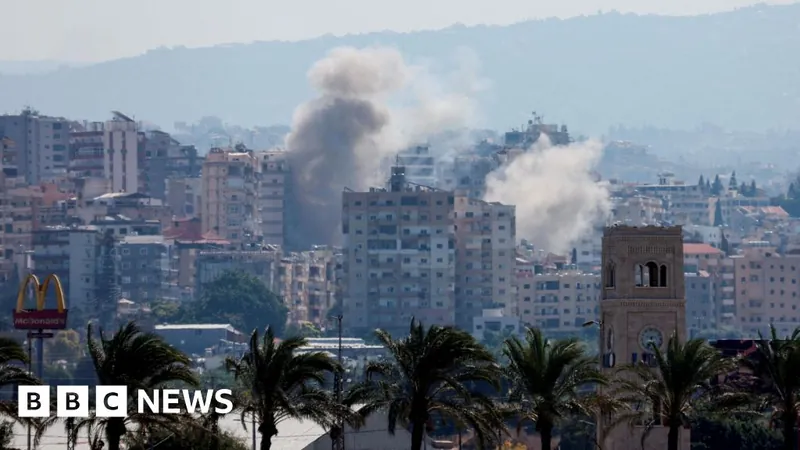
Tensions Soar: Israel Prepares for Potential Ground Offensive in Lebanon
2024-09-26
In a significant escalation of military actions, Israel's military chief has indicated that ongoing airstrikes in Lebanon, aimed at the militant group Hezbollah, are setting the stage for a potentially imminent ground invasion. Lt. Gen. Herzi Halevi, addressing troops stationed along Israel's northern border, stated, "You hear the jets overhead; we have been striking all day. This is both to prepare the ground for your possible entry and to continue degrading Hezbollah."
Recent Israeli airstrikes have reportedly claimed over 50 lives, targeting key Hezbollah sites including their intelligence directorate and weapon storage facilities. The health minister of Lebanon, Firass Abiad, confirmed these casualties, noting the mounting toll from the conflict.
As military activities intensify, diplomatic interventions are also ramping up. France and the United States are advocating for a 21-day ceasefire to mitigate escalating hostilities. The urgency for a diplomatic resolution was underscored by a meeting between French President Emmanuel Macron and U.S. President Joe Biden at the UN General Assembly, where both leaders stressed the need to prevent a wider conflict.
Lt. Gen. Halevi's statements reflect a shift towards a more aggressive stance, stating, “The goal is very clear - to safely return the residents of the north. To achieve that, we are preparing the process of a maneuver, which means your military boots... will enter enemy territory.” While U.S. military officials maintain that the prospect of a ground invasion is not imminent, the mobilization of two reserve brigades by the Israel Defense Forces (IDF) has raised concerns.
Cross-border skirmishes persist, with Hezbollah allegedly targeting Israel’s Mossad headquarters near Tel Aviv—marking a significant development since it was the first time the group aimed missiles at such a heavily populated urban area. Although the missile was intercepted with no reported damages or casualties, tensions remain high, with ongoing rocket fire from Hezbollah injuring several individuals in northern Israel.
In response to the escalation, UN Secretary-General Antonio Guterres has called for an immediate ceasefire, characterizing the situation as dire. Meanwhile, Lebanese Prime Minister Najib Mikati condemned the strikes as "blatant violations" of Lebanese sovereignty, emphasizing the need for a solution to halt the violence.
Israel's envoy to the UN, Danny Danon, expressed gratitude for the diplomatic efforts aimed at de-escalation but affirmed that Israel would utilize all necessary measures, adhering to international law, to achieve its objectives. He reiterated Israel's stance of not seeking full-scale war and its desire for peace.
The situation on the ground continues to evolve rapidly, with reported airstrikes targeting over 280 Hezbollah positions in recent days. The humanitarian impact is profound, with reports of fatalities and injuries, raising alarms about the escalation's potential ramifications for civilians in the region.
As the international community watches closely, the hope for a ceasefire rests on continued diplomatic engagement. The upcoming meetings and discussions may well determine the trajectory of this volatile situation in the Middle East.


 Brasil (PT)
Brasil (PT)
 Canada (EN)
Canada (EN)
 Chile (ES)
Chile (ES)
 España (ES)
España (ES)
 France (FR)
France (FR)
 Hong Kong (EN)
Hong Kong (EN)
 Italia (IT)
Italia (IT)
 日本 (JA)
日本 (JA)
 Magyarország (HU)
Magyarország (HU)
 Norge (NO)
Norge (NO)
 Polska (PL)
Polska (PL)
 Schweiz (DE)
Schweiz (DE)
 Singapore (EN)
Singapore (EN)
 Sverige (SV)
Sverige (SV)
 Suomi (FI)
Suomi (FI)
 Türkiye (TR)
Türkiye (TR)